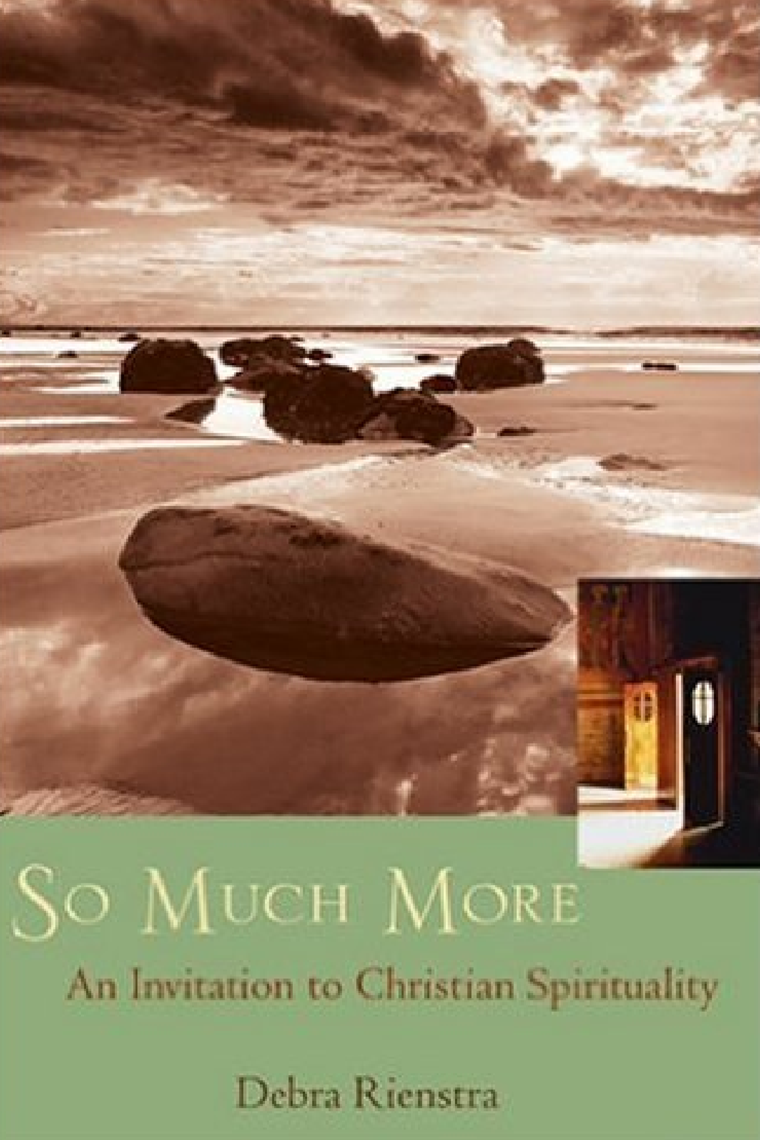Published: Dec 5, 2003
Publisher: Jossey-Bass
Retail Price: $22.95
Paperback: 272 Pages
Language: English
ISBN-13: 978-1-118-69313-1
What are the mysteries at the heart of Christian faith? Why do they matter? How can they transform our lives? Debra Rienstra answers these questions and many more in her evocative exploration of Christian life and faith. So Much More is a gesture of welcoming friendship for people who are new or newly returned to Christianity–those who are searching, lurking, longing, or learning. Anyone who wishes to understand Christianity better will welcome this genuine, heartfelt account of basic Christian beliefs and practices. Readers will find fresh explorations of Christianity’s foundational themes, such as incarnation, grace, suffering, and hope. Throughout this encouraging and passionate book, Debra Rienstra connects ancient articles of faith to contemporary concerns: our longing for transcendence, our desire for integrity, and our hope for intimacy with God.
This book is a gesture of welcoming friendship for people who are new or newly returned to the Christian faith–those who are searching, lurking, longing, or learning. So Much More starts from the beginning, assuming little to no knowledge about the faith, yet appeals to the demanding reader–those who want things explained plainly but also deeply and beautifully.
Rather than offering rational defenses of Christian doctrine, So Much More responds to concerns particularly urgent in our postmodern times: our longing for transcendence, our desire for integrity in all parts of our lives, our need to find a way of thinking and living that makes sense in a bewildering marketplace of ideas and lifestyles.
So Much More does not attempt to make Christianity simple or merely practical, but rather to expose for newcomers its richness and depth. Ecumenical and generous, its inviting tone and poetic prose create a compelling picture of how Christian belief, practice, passion, and imagination can open ordinary lives to God’s transforming love.
Content
Preface ix
Imagining the Christian Way
1 Something More:Transcendence 3
2 The Divine Dance: God with Us 19
3 Alienation from God:The Human Condition, Sin, and Repentance 39
4 Rescue and Restoration: God’s Saving Grace 61
5 Not the Last Word: Suffering and Hope 88
Living the Christian Life
6 Seeking the Heart of God: Prayer 115
7 Words of Life:The Bible 138
8 Shaping Our Souls Together:Worship 162
9 Companions on the Journey:The Challenge of Christian Community 183
10 The Work of Our Hands: Serving God and Others 208
Epilogue: Mystery 227
Notes 233
Suggestions for Further Reading 243
Acknowledgments 251
The Author 253
Index 255
Excerpts
The first section of the book presents basic Christian beliefs–the incarnation and the Trinity, sin, redemption, meaning in suffering–demonstrating how these truths can reshape our imaginations so that all the parts of our lives, blessed and terrible and everything in between, make sense together in light of some big answers to the big questions of our existence.
The second section of the book describes basic Christian practices–prayer, Bible reading, worship, community, and service–inviting readers to ground their own spiritual practices in tradition while adapting the hard-won wisdom of the past for modern times.
Chapter 2, p. 20
That the baby Jesus could be both fully divine and fully human, as Christians believe, defies logic. And for those who believe that God’s greatness inheres in his distance, in his difference from us, the incarnation is an offense. How can it be, and why should it be? No one can answer how it can be. On this point we stand on the precipice of mystery. But why it should be is easier to comprehend. A God far distant from us in being and power, if he desires any relationship with us, will have to make himself known to us somehow. The question is how and to what degree. To what extent does God remain above and beyond, and to what extent does God move among us?
We see God in the majesty and complex elegance of nature, yet nature leaves us with many questions about God. We learn more about God from holy books composed through some extraordinary, God-influenced process. Yet even the Scriptures-though precious, instructive, and indispensable-are not enough. Neither the natural world nor volumes of books are sufficient to reveal the fullness of God because neither is like enough to God. If God is a personal being, then the best means to make himself known to us is through personhood, in a form with which we are familiar: the human. Christians believe that God took on human form in order to give us the key to unlock the mystery of himself. To take on our nature like this may seem to reduce God’s glory and power, but this is precisely what we most need to know about God: that God’s essential nature is love, the kind of love willing to diminish oneself for the sake of another. In the incarnation God in a way reduces his own stature out of love, like a parent kneeling down to comfort a frightened child, pressing the face of compassion to the face streaked with tears and saying: “Do not be afraid. I am with you.”
Chapter 5, p. 111
The fundamental question for all of us is this: How big is our hope? Will we let our hope be small and feeble, invested only in the human spirit and the temporary endurance of our remarkable and terrible species? Or will we fling out our hope beyond the stars themselves toward the repair of all things? When we hear the promises of the Bible; when we see light in the love of others, in deeds of mercy, in gestures of hope amid despair, in the renewing seasons of creation, in new life, what will we take that light to be? Pinpricks in an enduring field of darkness? Or glimpses of a real light beyond that darkness, a light more true in the end than the darkness?
Paul wrote to the Colossians that he wished for them the “full riches of complete understanding, in order that [you] may know the mystery of God, namely Christ, in whom are hidden all the treasures of wisdom and knowledge” (2:2-3). The Greek here for “complete understanding” is more literally translated “underflowing”-the deep interconnection among all things. In the depths of God, all things are ordered and harmonized, even the jangling surfaces of our suffering. We cannot explain it; we can only begin to touch that underflowing by receiving the transforming hope offered us in the mysterious, suffering love of Christ.
Chapter 6, pp. 136-37
I know from experience that there are places of grief and desperation when even that heartbeat of desire seems to go silent, when it is beyond our strength to form even a shadow of a prayer. At those times we depend on the prayers of others and on the knowledge that prayer “does not depend on us.” Here I turn to that passage from Romans 8 so necessary whenever I think about prayer: “In the same way, the Spirit helps us in our weakness. We do not know what we ought to pray, but the Spirit himself intercedes for us with groans that words cannot express” (verse 26). When we pray, and also when we do not pray, we are surrounded by the prayers of others and sustained by the Spirit.
In fact, we are surrounded by the prayer of creation itself. That heartbeat of desire to be drawn into the heart of God rises wordlessly from the colors, sounds, and structures of creation. The psalmist writes that, “the heavens declare the glory of God; the skies proclaim the work of his hands” (19:1). Paul adds that the creation “groans as in the pains of childbirth,” awaiting freedom from its “bondage to decay” (Romans 8:22, 21). The pulse of that praise and longing sets our tempo.
Even when we cannot pray, the creation itself cries out to God. The wild irises bloom, the waves crash, the trees wave their branches, humpback whales set their tails toward the sky and sing.
Chapter 10, pp. 214-15
Another paradox involves the value of our help. On the one hand, nothing we do, no matter how noble and self-sacrificial, earns us points with God. There are no points. Salvation comes by grace through faith, “not by works, so that no one can boast” (Ephesians 2:9). However, another strong current in the Bible suggests that our behavior has enduring consequences. The author of the New Testament book of James writes, “faith by itself, if it is not accompanied by action, is dead” (2:17). Jesus told a story of the “Son of Man” (a title he used for himself) sitting in judgment and separating people like sheep from goats. The sheep are the ones who have acted in mercy and helped those who were hungry, thirsty, strangers, naked, sick, or imprisoned. The Son of Man welcomes them to receive their “inheritance, the kingdom prepared for you since the creation of the world.” The goats are the ones who lacked these deeds, and they wind up going “to eternal punishment” (Matthew 25:31-46). Sermons on this passage predictably make people squirm. Is it all about grace or not? Do our deeds matter or not?
This is another example of a useful tension in Scripture, and different branches of Christianity tend to lean toward one side or the other of it. Roman Catholics traditionally emphasize the importance of works and Protestants generally emphasize faith, but both acknowledge the necessity of both. I was taught to resolve the tension by declaring that good works do not earn salvation but are a sign of salvation. Good works grow naturally when God replants us by grace, like sick little trees, in the soil of himself. That’s true; people do experience that kind of natural result when they surrender their lives to God. Roman Catholics would wisely add that good works can serve as restitution for our sins and help us along that path of salvation. At any rate, we have to retain the tension and live with it. The “works count, so watch out” passages in the Bible do not express the final truth about salvation; but they remind us that God cares about what happens here and now, and they can keep us, shall we say, highly motivated.
When we manage to do good works, the question remains whether our service accomplishes anything. If we all work very very hard, do we actually bring in the kingdom? After all, good hospitals and schools and just governors and well-motivated scientific advances do make a difference in the world. At the college where I teach, we expend a great deal of effort urging students to find their gifts and use them to build the kingdom; to go out there and infiltrate every field of knowledge and every profession, from accounting to filmmaking to civil engineering; and to infuse a Christian perspective into everything they do. We often sound like cheerleaders: “Engage the world! Redeem culture! We’re hard-working Protestants and we can do it! Yes!” I believe with all my heart that God uses people’s efforts to heal and bring hope; I see it every day. But the danger is that we might get all triumphant and think that we’re doing it and not God. Humanity is evolving; we’re contributing to progress; and if we keep at it, someday angels will descend on clouds to thank us.
This kind of self-congratulation amounts to self-flattery. We would all love to be worthy of God’s favor; we would love our work to earn points with the Almighty. Probably that’s why the staunchest saved-by-grace people work so hard: deep down, we would rather earn it. We like to think of ourselves as competent and deserving, so that grace is harder to accept than fair wages. This is, at heart, the sin of pride. A tendency to work too hard, even for God, can participate in the idolization of work in the culture around us. We might put a label of Christian service on it, but hard work without rest can be a mask for a sense of our own indispensable importance and a desire to look good and earn God’s favor. If we’re honest when we look under the surface of even our best efforts, we see them tainted by vanity, ignorance, arrogance, hypocrisy, foolishness, and any number of other flaws large and small. Better to rest from our work regularly and remember that whatever good comes of our service is God’s doing.
What a great relief, because no matter what you choose as your contribution to the world, you will have many moments of failure, frustration, discouragement, and even despair…. No matter how many surgeries you perform on children in Guatemala with cleft palates, many more will still need help. No matter how many homeless alcoholics you shelter and help, many more will die on the streets. The world’s pain is far too big for you or your government or your organization to solve completely. We have to credit our successes to God so that our failures also can rest in God’s open hand.
Leaving the outcome to God frees us from the need to succeed. We’re not planning the entire kingdom operation, and we’re not responsible for its ultimate success. We’re just the agents. We have to do our own part the best we can, with God’s help, and let the Spirit of God move freely in fire and wind.
Epilogue, p. 228-29
I have found that the mysteries of the faith do not require that we shut down questions but that we open ourselves to greater answers and perhaps to questions we have never asked. We perceive the energy of the atom and its infinitesimal particles only through a combination of higher mathematics, powerful electron microscopes, and theorizing minds. Similarly the mysteries of God call from us a combination of all our capacities and then some-intellect, imagination, will, feeling, and the gift of the Spirit-before we can touch their truth.
Developing these capacities takes time and daily practice. When it comes to apprehending mystery, we cannot expect, as we do in so many areas of life in the postmodern world, to follow a programmed pattern of behavior and receive instant and repeatable results. We tend to expect these days that we can purchase experiences in convenient packages-the thrilling movie, the perfect restaurant meal, the fabulous vacation. The capacity to apprehend mystery is not like that. It cannot be packaged or purchased. Instead it requires, as writer and pastor Eugene Peterson puts it, a “long obedience in the same direction.”
So the Christian faith invites us into daily practices in the same direction, into what soon begins to look like a pilgrimage: we study the Bible, worship together, serve in Jesus’ name. We pray and hope and seek God’s guidance and wait. We face discouragements and setbacks. As we do these things, it’s not so much that we understand the mysteries more clearly but that the mysteries have their effect on us, slowly molding us over time. Our behaviors change; our thoughts change; our desires and hopes slowly transform. We start becoming the people God has designed us to be, people in communion with God-friends of God who take on the reflected light of God’s presence. As the psalmist observes, “Those who look to him are radiant” (Psalm 34:3).
Study Guide
Thank you for your interest in So Much More. I have put together this study guide to help make the book more useful for groups and perhaps individuals, too.
You are welcome to copy this guide as much as you like. Sales of this free guide for profit are, of course, prohibited.
I have designed this study guide especially for use in small groups of four to ten people, studying the book at the rate of one chapter per session. This is the most common format for book groups, but of course many other configurations are possible.
If you do study the book with a small group, I would strongly suggest that at least one person in the group be an experienced and knowledgeable Christian in order to offer a little insight when people have questions in response to issues raised in the book. This person does not necessarily have to lead the session, however. There might be another person who is appointed leader or convener, or the members of the group might take turns as leader. In any case, the leader need not feel obliged to provide expert lectures or get the group to some sort of concensus on a given topic or question. The study sessions are meant to be discussion times and not lessons. Sometimes the best thing to do if you get in a tangle is to formulate a question well and then ask people to consult some real experts on the matter and report back. The priority in the session itself should be to encourage each other to share experiences, questions, and responses to the chapters.
For each chapter, I have included several elements that you can use in any way that seems best to the group:
- a brief list of topics with page numbers
This can serve as a rough map of each chapter, helpful as an overview of the chapter or as a quick reference if anyone would like to find a particular passage.
- discussion questions
These are not right-answer sorts of questions. They are meant to get people talking honestly about deep things, even if that means exposing some confusion or uncertainty.
- several Bible passages
For those who wish to include some Bible study in their sessions, I have listed passages that are either mentioned in the chapter or otherwise relevant to it. I always include the Psalm from which the chapter’s epigraph is taken and at least one passage from the Gospels.
- a concluding prayer
This is one possible way to conclude your session.
I would suggest a brief prayer at the beginning of each session to focus the group on the task at hand and to signal the group’s welcoming of God’s presence in your midst. A time of silence would also be appropriate if the group is comfortable with it. An opening silence can be helpful in keeping the discussion serious and not on the level of mere small talk or chatter. Also, there’s so little silence in our lives that many people welcome permission to be silent.
Here’s one way to order the session as a whole:
- opening prayer or silence or both
- invitation to members of the group to point out places in the chapter that were especially meaningful, surprising, troubling, or helpful to them
- discussion questions
- reading of Bible passage
- closing prayer or silence
If the group is very talkative and open and the “invitation to respond time” threatens to go on for hours, you might jump right to the discussion questions. People will get the word out about their favorite passages during this time anyway, while the questions give a more sensible order to the discussion than a random, around-the-group kind of approach. On the other hand, if you have a very quiet, shy group, you might consider giving each other a few silent minutes to respond to each question with brief written notes before asking people to speak.
For groups in which people are very new to the faith, the Bible passages may seem to jump out of nowhere unless someone is available to give a little context beyond the brief words in this guide. Groups whose members have more experience may have no trouble integrating Bible study into the session. However much Bible knowledge your group brings to the table, I have offered a number of suggested Bible passages for each chapter with the thought that a given group will probably choose only one per session.
If you wish to use a Bible passage during the session, it would be wise to have the leader for the week choose one ahead of time and study it on his or her own. The leader could prepare a question to start the discussion, or could simply read the passage aloud and ask people, if they wish, to share how the passage speaks to them. Another option would be simply to read the chosen passage aloud, then invite a time of silent reflection. If this seems like the right approach, I suggest reading the passage as the final action before the closing prayer.
(An alternative use for the Bible passages would be for members of the group to read them on their own between sessions. Perhaps they could even become core texts for one-on-one Bible studies with a knowledgeable pastor or other teacher.)
At the end of the session, I suggest another time of prayer. You may use the suggested prayers given here if the group finds that they speak adequately to their thoughts and feelings. Alternatively, someone in the group could speak an improvised prayer or invite members of the group to pray aloud as they wish. A closing time of silence is another option, as long as someone is appointed to end the silence with an “amen” or a “time for snacks” or whatever your group chooses. Once again, do what seems right to you. (By the way, if you happen to be using this study guide on your own, please feel free to say “I” instead of “we” if you use the suggested prayers.)
I would be glad to hear about how your use of this study guide went, especially if you have useful suggestions for improvement or just additional ideas that might help others.
Main topics in this chapter
- skepticism as a fashionable worldview
- common experiences of transcendent reality
- why people prefer to be spiritual but not religious
- reason and experience as a means to faith
- testimonies of God gripping people
- deciding which view of transcendent reality is closest to truth
- humility about how we perceive truth
Questions for discussion
- Through what kinds of experiences have you most keenly sensed the something more? You may wish to spend a few minutes in silence, writing brief notes, before sharing your responses.
- How have you been answering these questions in your own mind:
- Are some explanations for truth better than others?
- If God reveals, then why are there so many conflicting religions? Why doesn’t everyone seem to receive the same revelation?
- If you believe that Christianity is the best explanation of truth, does that mean you are judgmental about other religions?
- Speaking from your own experience and what you observe in others, how do people come to religious faith?
Suggested Bible passages
Psalm 8
A song of wonder at our smallness and our significance in relation to God.
Luke 9:28-36
A few of Jesus’ disciples receive a gift: a moment of extraordinary vision in which they are allowed to see beyond mundane reality to something amazing. They see their familiar teacher in a glorified state, and must have been reminded of the stories in Jewish scriptures in which only special people can endure the dazzling presence of God as revealed on the tops of mountains. Notice that this experience awakens the disciples out of a sleepy state, and that they have no idea afterwards how to explain it to others.
Genesis 32:22-32
Jacob, the Old Testament patriarch, experiences a mysterious encounter during the night. He concludes in the morning that he has wrestled with God. Notice that he comes out of this encounter with a wound, a blessing, and a new name.
Acts 9:1-19
Saul is given a powerful vision that turns his life around. Notice how his pride and violence turn to humility and even helplessness. Like Jacob, he emerges from this experience with a new identity and a mission.
Closing prayer
God, how can we know you are there? We want to know. We want to know the truth, as best we can. But we are often distracted and dimmed in our understanding because we’re just trying to get by. It’s hard to make sense of this world with all its creatures and all its pain and beauty. It’s hard to make sense of our lives when there are so many possible explanations. Help us. Help us to see and feel and understand what really IS. Give us moments of clarity and help us to treasure and remember those moments. Take the dimness of our souls away. We are waiting for you. We are waiting. Amen.
Main topics in this chapter
- why the incarnation doesn’t and does make sense
- the identity of Jesus in the Gospels
- exploration of Jesus’ identity in the rest of the New Testament
- development of the doctrine of the Trinity
- how Christians talk about and experience God as Trinity
- God’s love for the physical world
- the incarnation as God with us and for us
- the nature of God and the essence of love
Questions for discussion
- Some people are shy of believing that the human person named Jesus was also God. Why, in your opinion, is this a hard belief for some? Why do you think the orthodox church has insisted on this point?
- When you think of God, what images come to mind? Does the idea of the Trinity make any difference to the images in your mind?
- What implications does believing in the incarnation have for you?
Suggested Bible passages
Psalm 23
A song of comfort and trust, especially amid pain.
John 1:1-18
In this magnificent prologue to the most poetic of the four Gospels, John connects the person of Jesus with the God of creation, declaring that this Jesus reveals the full glory of God.
Luke 9:18-22
Jesus recognizes that people are trying to decide exactly who he is. When Peter confesses his belief that Jesus is the Messiah, Jesus tells them not to make this public yet.
Isaiah 53
This “servant song” from the Hebrew prophets described so well what happened to Jesus that his disciples came to understand it as a prophecy fulfilled in his suffering and death. The purpose of Jesus’ death seemed clear in this interpretation, too: to save God’s people from their sins.
Hebrews 1:1-4
The author of this text writes eloquently and concisely, summarizing an understanding of Jesus’ identity steeped in the Jewish scriptures.
Closing prayer
God, why do you have to be so confusing? Why couldn’t it all be simpler? We hear what people say about you, that you are loving and powerful, just and merciful, above all things and within us—and we wonder if this can be possible. Jesus, can you have walked the earth and died long ago and be alive still? Spirit, are you real and ready to guide us? When we wonder if this is all too weird or too good to be true, help us to believe. Help us to know that however mysterious you are, you are God with us, and for us. Amen.
Main topics in this chapter
- the concept of sin as honesty and wisdom
- the Genesis story and God’s perfect design
- the fall in Genesis and human freedom
- interconnectedness and sin
- loss of free will
- sin as our common, tragic condition
- the power and pervasiveness of sin
- evil as excessive and senseless
- the poverty of our supposed goodness
- the necessity of humble repentance
Questions for discussion
- What are some insights about the human condition that we can gain from the first chapters of Genesis, whether we believe in the literal, historical factuality of the story or not? How do those insights affect the way we think about what’s wrong with the world?
- How much free will do you think human beings have? To what degree are our choices free, and to what degree compelled by forces we can’t control?
- Does the author’s definition of sin differ from other definitions you have heard?
- What are some explanations people give for acts of great evil?
- In what areas of your life do you feel distant from God?
Suggested Bible passages
Psalm 51
This is the most beloved and often-used prayer of repentance in the Bible.
Matthew 5:14-48
Jesus explains what it really means to fulfill God’s law. It’s much more difficult than people had thought, because the law must be fulfilled in the heart. You could also begin reading at the beginning of chapter 5.
Genesis 1-3
This story of the world’s creation and of humans’ fall from God’s perfect design. Notice that the creation story is told twice in slightly different ways.
Romans 3:9-31
Paul is writing here in his heavy theological mode. In order to show that no one lives up to God’s perfect standards on his or her own, Paul quotes a long list of Old Testament scriptures. But then he also gives the solution: faith in Christ.
Closing prayer
God, we want to believe that we are good people, but we know it’s not really true. We are not good in everything we do or say or desire. We are not good down to our very core. Your design for us seems so wonderful yet so impossible. And sometimes we become fond of our own flaws. Teach us to see the truth about ourselves, even if it’s embarrassing, even if it’s deeply painful. But please teach us slowly and gently, because it may be hard for us to endure. Teach us so that we can begin to come alive again. Breathe into us your forgiveness, your Spirit, your new life. Amen.
Main topics in this chapter
- grace and the story of the prodigal son (or father)
- definition of salvation as rescue and restoration
- salvation as God’s action in the past, present, and future
- salvation in the past as Jesus’ work: substitutionary atonement
- Jesus’ work as perfect sacrifice
- Jesus’ work as victory (and other explanations)
- the cross and empty tomb as mysteries
- the importance of a real resurrection
- salvation in the present as pilgrimage
- salvation as change of identity and purpose in all areas of life
- dying and rising in daily life
- the question of salvation in the after-life
- healing and restoration of all creation
Questions for discussion
- Of all the descriptions given for how Jesus’ life, death, and resurrection saves us from sin, which seems most explanatory and helpful to you?
- Do you find it hard to believe that Jesus rose from the dead?
- Where are you on the journey toward the kingdom? You may wish to draw a picture rather than express this in words.
- Is there an area of your life where you desire “dying and rising in Christ” to happen?
- What do you think about the “who’s in/who’s out” problem?
- Where do you see signs of the coming kingdom here in this world?
Suggested Bible passages
Psalm 126
This worship song expresses joy in God’s acts of rescue for the ancient Hebrews, but Christians have always adapted such prayers for application to the kinds of rescues God works in our individual lives, too.
Luke 15:11-32
This story of the prodigal son (or the prodigal father) is one of the most important Jesus told. The part of the story about the older brother and his irresistible anger is also very important; it speaks to the attitudes of those who are already on the inside and like their position of privilege.
John 3:1-21
This passage is the source of the famous phrase “born again” and also of the famous verse, “For God so loved the world….” These appear in a story about a cautious, curious Jewish religious leader coming to Jesus in secret. Jesus recognizes that the fellow, like all of us, is both highly invested in his old ways and longing for something better. Jesus’ words to are deliberately metaphorical and puzzling; Jesus wants Nicodemus to let go of his old grids of perception and understanding, allowing God to transform him in ways he can’t imagine.
1 Corinthians 1:18-25
Paul understands that salvation by the cross might seem crazy or offensive. But he has come to see the wisdom of God in what seems like foolishness.
1 Corinthians 15:51-58 (or 1-58)
This famous passage, some of which the composer Handel set unforgettably to music in his oratorio Messiah, is the lengthiest treatise on resurrection in the Bible. Notice that what Paul is pleased to reject about our current existence is not that we have bodies but that our bodies die—they are perishable, mortal.
Galatians 5:16-25
Paul explains the transformation that occurs when people give themselves over to God. He opposes the works of the former self to the fruits of the Spirit’s work in us. Paul’s use of the word “flesh” here (Greek: sarks) can be confusing; it should not be equated simply with the body or the physical world. Some translations use the term “sinful nature” to translate sarks, but that might be an overtranslation. We can think of the “desires of the flesh” as the impulses we have when our bodies and spirits are not harmonized according to God’s design for our full nature.
Philippians 2:1-11
In this eloquent passage, Paul calls his readers to love each other, pointing to the example of Jesus’ self-emptying love.
Revelation 21:1-22:5
A vision of the new heaven and the new earth, entirely beautiful and blessed. Notice that the tree gives its leaves to heal the nations, and all nations bring their glory into this city. As for those left outside: are their sins being burned away in that lake of fire, that they might then enter the city, too, purified and full of joy?
Closing prayer
O God, we want to be saved! Saved from all that is horrible and frightening about this world, from our suffering and shame, even from our daily troubles. We want relief from our internal conflicts and darknesses. We want this world to be rid of all its evil and pain. Please save us. Please begin to work in us and transform us into the people you have designed and intended us to be from before all time. We know this will not be easy. We know this will take time. We know there are parts of us we do not want to surrender to you. Be patient with us. Send us trustworthy companions on this journey. Keep us safe from the dangers. Guide us home. We want to come home. Amen.
Main topics in this chapter
- miracle debris crosses
- the story of Job
- logical answers and the cross as a response to suffering
- asking why
- God’s active and permissive will
- anger, protests, and doubts
- self-examination, bargaining, and blame
- suffering redeemed as blessing
- communion with Christ in suffering
- nothing can separate us from God’s love, and the hope of healing after death
Questions for discussion
- Some people believe that God is not completely in control, and that’s why bad things happen. What kinds of experiences seem to support this belief? What kinds of experiences support the belief that God is in control, even when tragedies strike?
- Do you know Christians who have shown that faith changes the quality of suffering? How is their suffering different from others’?
- Have you ever experienced suffering that revealed something important and hidden?
- Have you ever experienced suffering turned to blessing?
Suggested Bible passages
Psalm 22
A poem that advances through several stages of engagement with God in the midst of suffering.
Psalm 103
A poem that works like healing balm in its testimony of God’s faithful love.
Luke 22-24:11
All four Gospels give detailed though different accounts of Jesus’ suffering, death, and resurrection. Luke’s account is a good place to start. (The other accounts are Matthew 26-28, Mark 14-16, and John 18-20.)
Genesis 45:1-15 and 50:15-21
If you have never read the story of Joseph, begin at chapter 37 and just keep reading. If you know the story a little, consider in particular the passages suggested here where Joseph comes to understand all his suffering as part of a much greater plan. Not everyone gets this kind of perspective, but it can be very humbling and amazing when it comes.
Isaiah 35
This soaring promise of God’s intended restoration for his people includes the creation’s healing as well as peace and flourishing for people.
Romans 8
This passage sums it all up with its eloquent assurance of salvation that transcends all suffering. Notice how the promises in this chapter move from the theological to the existential.
Closing prayer
God, hear us. We bring our pain to you because we cannot carry it on our own. As for the world’s pain, we can hardly look at it. So much suffering—and it is too wide, too heavy, too terrible for us to bear. What were you thinking, Jesus, when you died on that cross? Were you bearing all this pain for us? When we are angry and afraid, teach us to look in your face. Give us a vision of your deep love, and bring healing. Bring healing to us and to this world, even through us. Show us your face. Amen.
Main topics in this chapter
- openness to God as the beginning of prayer
- prayer changing us and changing God
- varieties of prayer
- communal prayer
- listening in prayer
- praying the Psalms
- gratitude and praise
- prayers for help and “why” prayers
- confession
- intercessions for others
- desire as prayer and the prayer of creation
Questions for discussion
- If God has “always already shaped history with a generous condescension to our small and scattered wills,” how urgently should we pray for ourselves, others, and the world?
- Have you ever experienced good communal prayer? What made it good?
- What do you find difficult about individual prayer?
- Has prayer ever “worked” for you? If so, how?
- What kinds of prayer do you think you could practice in your life right now?
Suggested Bible passages
Psalm 34
A song of great assurance, reflecting on God’s faithfulness in hearing those who call to him.
Psalm 139
A poem celebrating God’s profoundly intimate knowledge of each of us.
Matthew 6:5-15 and 7:7-12
Here Jesus teaches the Lord’s Prayer and offers further wisdom on prayer.
I Samuel 1:1-2:11
The story of Hannah is one of many in the Old Testament about someone who prayed passionately. In Hannah’s case, God granted her request. Notice that her passion in prayer was misunderstood by the official religious person in authority. Notice also that Hannah responded to God’s goodness with an act of great dedication.
Philippians 4:4-9
These final words of advice in one of Paul’s letters offer good advice about prayer and life. The combination of prayer and thanksgiving, especially, helps bring about that peace.
Closing prayer
God, will you awaken our spirits? Will you pray with us by your Spirit and teach us to pray? Overcome for us the obstacles, the distractions and discomforts that keep our hearts silent. Show us that place in our souls where we can rest in your presence and pour out our thoughts and feelings to you. Let our prayers join with the prayers of the faithful in all times, with the praise of all creation. Amen.
Main topics in this chapter
- loving the Bible as living word
- how living texts generate meaning
- authority and types of inspiration
- the Bible’s apparent offensiveness
- deriving guidance from the Bible
- reading in community
- yielding our agendas to the text
- ways of reading the Bible
Questions for discussion
- Do you have experiences of people using the Bible to serve bad ends?
- Do you have experiences of people using the Bible for good ends?
- What do you most desire to happen when you read or listen to the Bible?
- Are there words from the Bible that have nourished you? Describe how that has happened for you.
Suggested Bible passages
Psalm 119:9-16
A portion of a much longer love-song to God’s law and word.
Luke 4:1-30
These episodes from early in Jesus’ story demonstrate that he knew the Hebrew scriptures very well. In the first story, the words of Scripture enable Jesus to resist serious temptations. In the second story, the words of Scripture establish Jesus’ mission. But notice how the townspeople resist when Jesus quotes texts that threaten to read them.
Colossians 3:12-17
Paul places the words “let the word of Christ dwell in you richly” in the context of encouragement to create a compassionate and forgiving community and engage in teaching, worship, and service. This is the proper context in which the Bible can supply those living words of Christ.
Hebrews 4:12-13
In the context of reexamining the promises of God for his people, the author describes the power of the inspired word.
2 Timothy 3:10-17
This passage contains the classic verse about inspiration. It comes in the context of broader advice about staying true to the faith. The Scriptures give strength for that endurance. Notice also the particular things for which Scriptures are said to be useful.
Closing prayer
Spirit, please open this book for us. Let it be a living word. Forgive us when we understand badly or misuse the words in this book. Repair our mistakes and show us, together, how we ought to understand. Let your words dwell richly in our hearts. Let them be sustaining nourishment for our journey. Amen.
Main topics in this chapter
- shaping the soul
- why some people come to church
- why others don’t
- worship as evidence of what a church is really about
- what worship should accomplish, whatever the style
- teaching a language for joy
- hearing the Word
- saying sorry, receiving grace
- the sacraments
- the necessity of faithfulness
Questions for discussion
- If you have not been a churchy person in the past, what has kept you away?
- If you have been a churchy person, what has kept you coming?
- What has confused or impressed you about the worship services you have attended?
- What might the church need you for? What can you offer the larger body of Christ?
Suggested Bible passages
Psalm 84
A song of love for the holy places of God.
Psalm 96
Worship arises in this psalm from joy and awe, and from the worship of all creation.
Luke 24:13-35
This wonderful story does not appear to be about worship. But interpreters over the centuries have seen in it a pattern that worship ought to follow. Jesus meets the disciples in their sorrow, but they do not understand that the one with whom they discuss the Scriptures and break bread is Jesus himself. Through preaching and then through the meal, Jesus is made known to them. Thus in worship we seek to imitate this pattern: we receive the One who seeks us out, we hear Jesus’ words, and we receive his hospitality at the communion table.
Acts 2:37-47
As the number of people who believed in Jesus expanded, certain practices became standard in their communities. This passage mentions teaching, fellowship, breaking break (communion), prayers, attending temple, sharing their goods, and public witness.
Revelation 7:9-17
This vision of heaven depicts a great assembly worshiping God in joy. Notice how the people come from every nation, tribe, people, and tongue.
Closing prayer
God, we want you to shape our souls. We know that worshiping with your people is supposed to make that happen. But it just doesn’t always work. We come with all kinds of barriers up, and other people’s mistakes and failures put up barriers, too. Please give us patience, encouragement, and openness. Please work through our leaders so that they can help us worship as truly and genuinely as we can. Shape us despite everything, bless and disturb us, send us a good supply of grace. Amen.
Main topics in this chapter
- what Christian community should be, but often isn’t
- historical divisions in the church
- plenitude and variety in the church
- the blueprint for community in 1 Corinthians 12
- the communion of the saints
- teaching, spiritual friendship, accountability, and discovering gifts in community
- suffering and rejoicing in community
- Christian community as a place to break down barriers
- the centrality of worship to community
- God’s communal nature
Questions for discussion
- What have been your best experiences of community?
- What do you most long for from Christian community?
- What do you most fear?
- How is the Christian community serving as a witness of alternative community to the world? How is it failing to do so?
Suggested Bible passages
Psalm 133
A short poem with strange metaphors, but the relationship between harmony and blessing is clear.
John 15:1-17
The night before he was crucified, Jesus ate and prayed with his disciples. Here he gives instructions to this prototype community, based on the law of love. If you read further around this passage, you will notice how important is the work of the Holy Spirit in sustaining this new community.
Acts 2
Here the Holy Spirit pours out new power to establish the community of Jesus’ followers. The diversity and wildness of this community baffles some and irresistibly attracts others. The end of the chapter describes a time during which the early church seems to have truly lived out Jesus’ ideals.
I Corinthians 12-13
Paul’s practical words about using gifts in community move into the basic ideals of community that make the use of gifts possible. This blueprint then transitions into Paul’s great poem on love, which describes the kind of muscular, self-giving, divine love on which community must be based.
Closing prayer
God, community is so difficult. And your people have failed so badly so many times. Please forgive us all for our pride, our selfishness, our resistance. Jesus, you will have to change our hearts if we are going to live together as you wanted us to. We cannot do it unless you transform us from the inside out. Please overcome our conflicts and confusions with your Spirit of grace. Give us perspective. Teach us real, lasting, forgiving love. Give us hope so that we can be a community of hope for others. Amen.
Main topics in this chapter
- defying mortality through service
- the relationship of service to obedience and gratitude
- Jesus as our model
- the role of good works in the Christian life
- finding our own ways to serve
- taking inventory of what you can offer
- finding the intersection of your passion and the world’s need
- suffering and service
Questions for discussion
- We often think of obeying God as a matter of submitting to rules. What is important and what is unimportant about rules of behavior?
- How might it change our attitude and choices if we think of obedience as an expression of gratitude?
- How might it change our attitude and choices if we think of obedience as a witness of the coming kingdom?
- What do you suspect might be your great passion right now? How might God use that passion?
Suggested Bible passages
Psalm 90
“Teach us to number our days aright”—one of the most important things Christian faith can do.
Matthew 5-7
Known as the “Sermon on the Mount,” this passage contains the heart of Jesus’ ethical teachings. They seem at once less stringent and far more challenging than any set of rules or any other wisdom system.
Matthew 25:14-46
Jesus’ stories have long motivated people to acts of service great and small.
Mark 12:28-34
Jesus sums up the law for our lives with these commandments to love God and each other. All our decisions about shaping our lives ought to be held up to the light of these overriding purposes.
Romans 12
Paul here reiterates Jesus’ ethical teachings in his own words.
Closing prayer
Take our lives, dear God, and use them for your good purposes. In this crazy, sad, beautiful world, we are looking for meaning. Give us something to do! You know us each so well, you know our gifts, however hidden. Show us what we can offer you, and grow in us the fruits of the Spirit. Lead us down the right paths so that we can find blessing and be a blessing. We will wait for your leading. Amen.
- How do Christians sometimes use “small, fold-up, portable truths” and “flattened mysteries” to hurt others?
- How have you felt the deep mysteries of the faith beginning to have their effect on you, beginning to transform you?
Reviews
Resources

Hamnet: Quiet Grief, Sentimental Speculation
Hamnet is getting excellent reviews, deserved in many ways. Beautiful cinematography, excellent acting, quiet and intensely sad—you can plan on a couple Oscar nods for this one. As your resident Shakespeare professor, however, I will suggest—no surprise here—that the film is only tangentially related to the actual Shakespeare.

Beavering Our Way, Reformed Style
In a world threatened by drought, fire, and soil erosion both literal and metaphorical, we are working together here to create a healthier ecosystem of thought and reflection.

Angels At Large
“Ha ha. Anyway, I’m OK. Actually, I’m in a better place now, you know? Having ‘Angel At Large’ status for a while isn’t so bad.”

Refugia Podcast Episode 40 Kipuka to Kipuka: Islands of Life, Faith, and Restoration
Our final episode of Season 4! This week, we travel to Hawaii with a whole troop of good people to visit some remarkable refugia spaces near Kaneohe Bay on Oahu. This episode, produced by Colin Hoogerwerf and Jim Stump, first aired on the Language of God podcast in April of 2025.
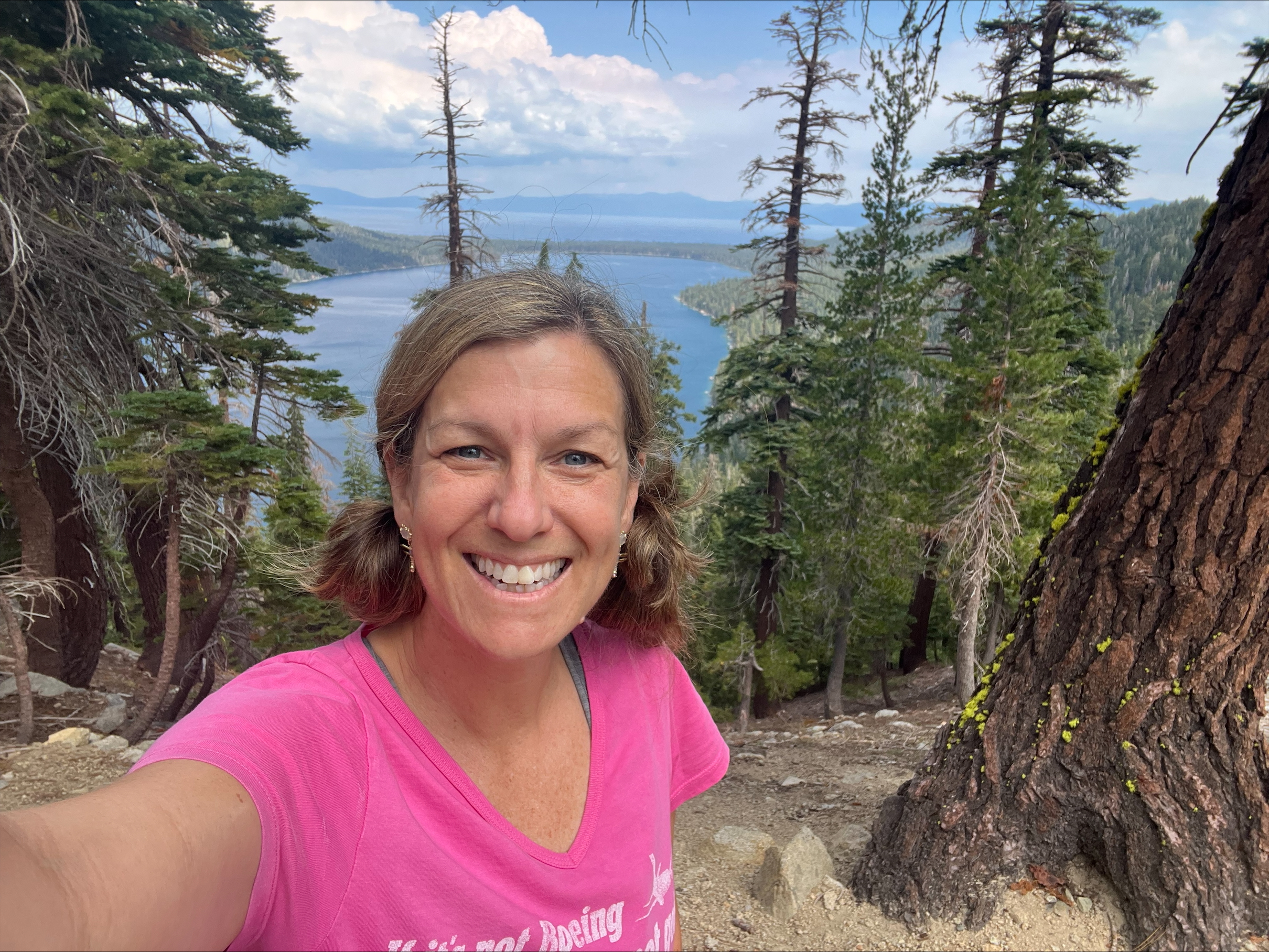
Refugia Podcast Episode 39 Seeds of Peace and Hope: Christina Bagaglio Slentz and the Diocese of San Diego
Today, I’m talking with Dr. Christina Bagaglio Slentz, Associate Director for Creation Care at the Catholic Diocese of San Diego. Christina has a background in sociology, with a PhD in international studies and global affairs. She’s also a Navy veteran. Today, she serves a diocese of 97 parishes, helping to guide and empower people in their creation care work. The Diocese of San Diego is a microcosm of diverse biomes and diverse people, and it’s a fascinating example of refugia, because as a diocese, they are doing all the things. Christina and I talk about Laudato si’, solar energy, economics, eco spirituality, environmental justice advocacy, the centrality of the Eucharist, and the mutuality between caring for neighbor and caring for the Earth.
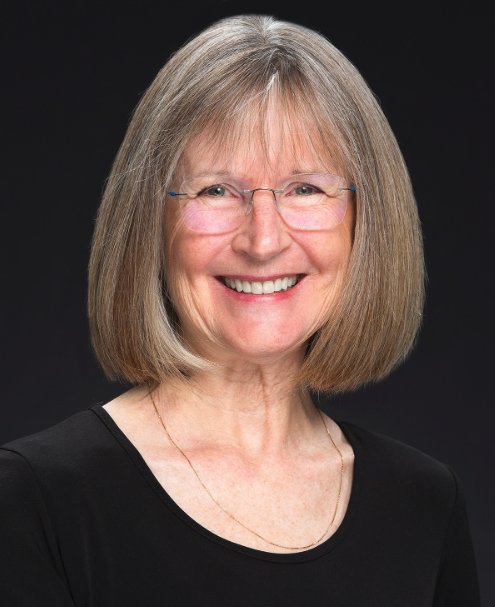
Refugia Podcast Episode 38 So Much Joy: Linda Racine and Traverse City Presbyterian Church
In 2022, there were multiple policies or overtures passed focused on creation care, and it really put out an alarm, saying “It’s serious, folks, the Earth is really in trouble. So we need to take strong action.” And they were encouraging all churches to reduce their carbon emissions by at least 25% in the next four years and get it down to net zero or net positive by 2030. A group of interested folks at church looked at that and said, “Let’s do it. Let’s go for it.”

Two Creatures, in Brief Encounter
I was right on top of her, taking down the platform feeder, when I finally noticed the tiny chickadee struggling frantically. She was caught in the tangle of netting and wire I had foolishly bunched on top of the squirrel baffle.

Refugia Podcast Episode 37 Land as Primary Text for Healing Community: Elaine Heath and Spring Forest
Elaine Heath is the abbess of Spring Forest, a new monastic community in Hillsborough, North Carolina. Spring Forest centers around communal prayer and meals, a vibrant farm, refugee support, and other ministries you can read about here. You can learn more about Elaine’s work as an author and speaker on her website, or in articles like this one from the Center for Action and Contemplation.
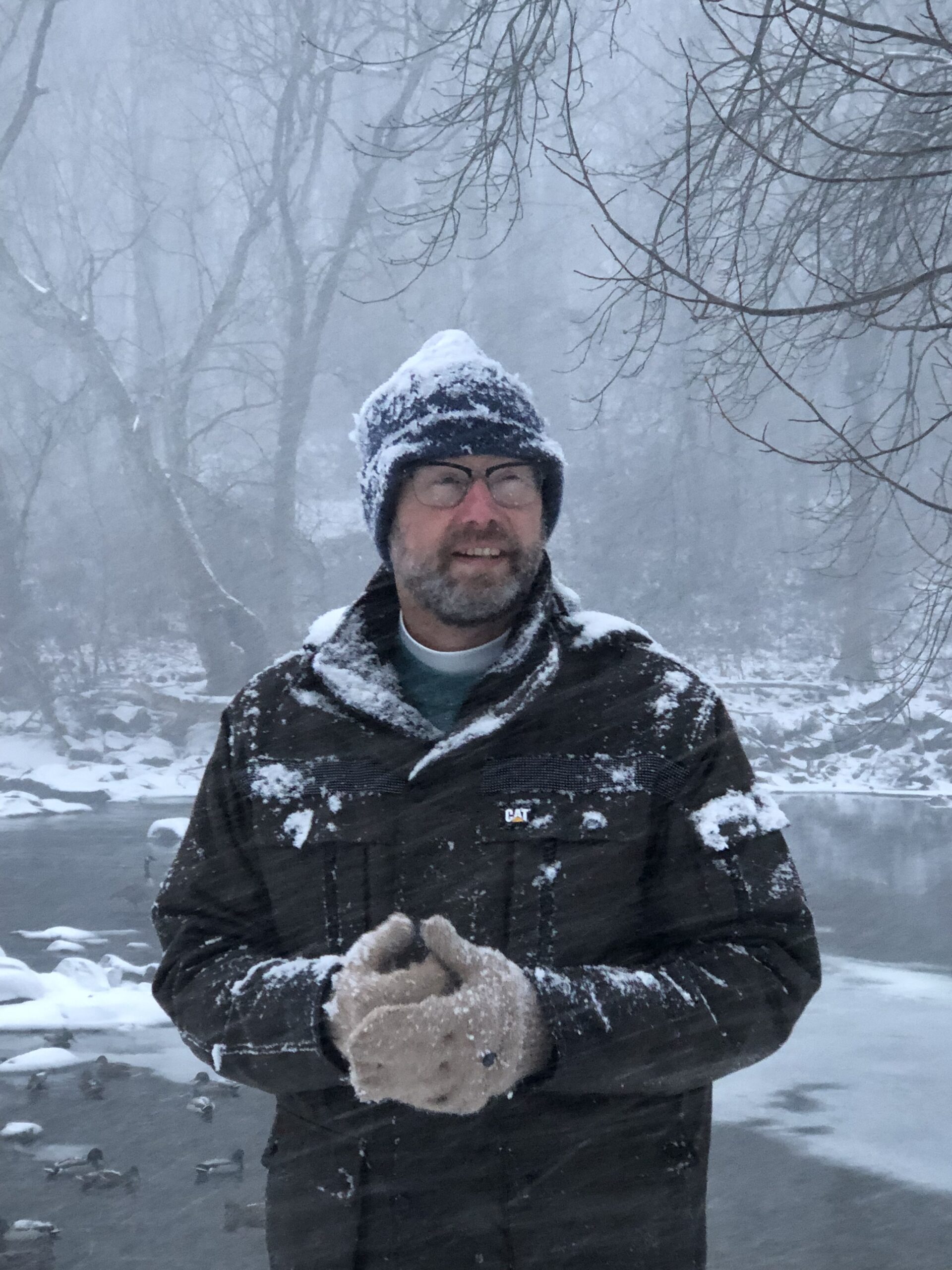
Refugia Podcast Episode 36 True Woo: Pete Nunnally and Water and Wilderness Church
Father Pete Nunally is the founder of Water and Wilderness Church, a Washington DC-based outdoor church and watershed community. You can read more about the model of Water and Wilderness Church here. Father Pete is a passionate and well-spoken advocate on his social media pages and other forums, as in this interview with Creation Justice Ministries.
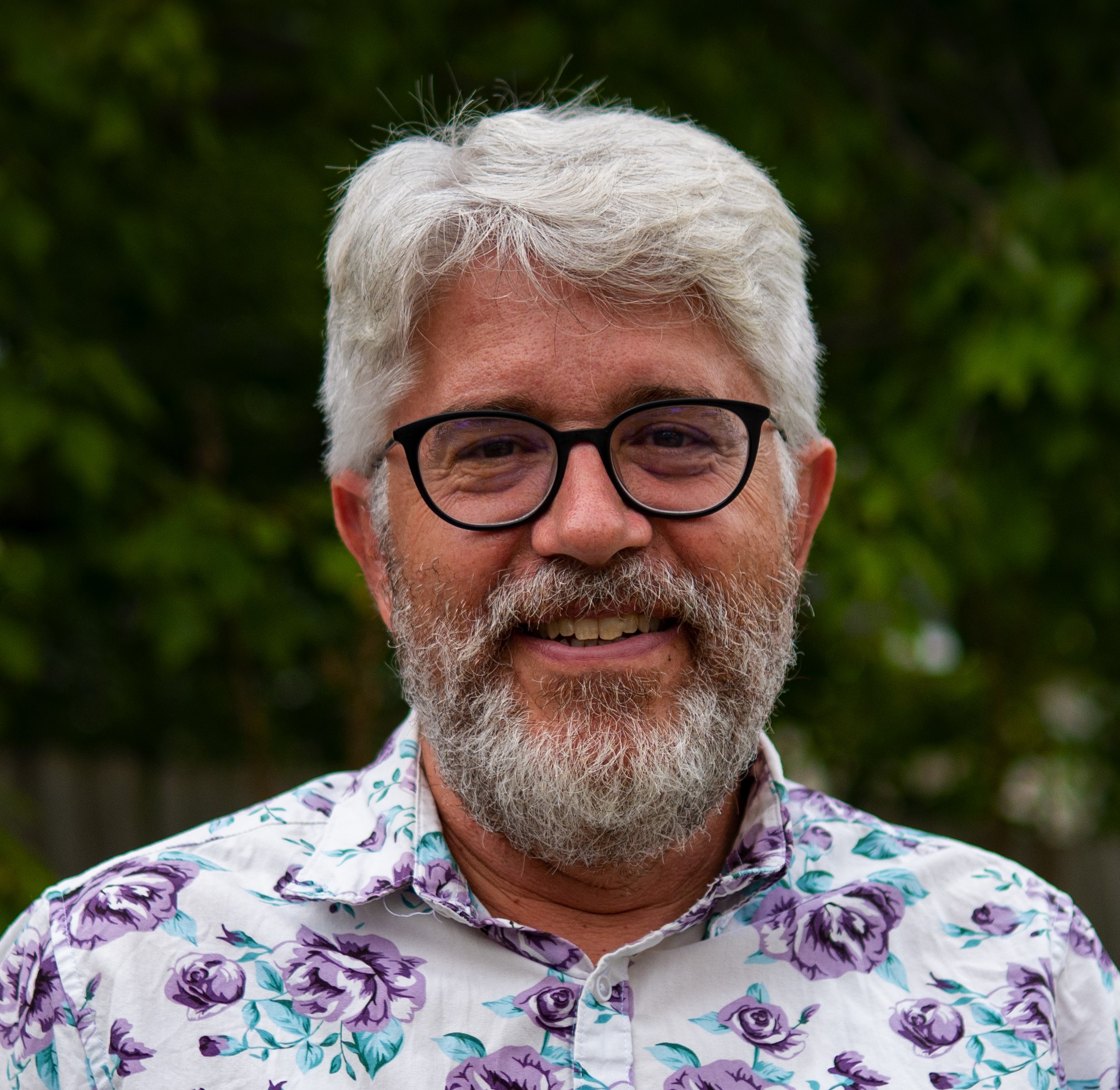
Refugia Podcast Episode 35 Peacemaking at the River: Doug Kaufman and the Anabaptist Climate Collaborative
Doug Kaufman directs the Anabaptist Climate Collaborative, an organization that leads climate justice initiatives from an Anabaptist faith perspective. Doug and his team support Mennonite and other Anabaptist churches, helping to build networks, train leaders, and empower climate-related initiatives. Doug describes environmental work as a form of peacemaking, a way of countering the slow violence of actions that cause and exacerbate climate change. Thanks to Doug for geeking out with me on theology and offering some glimpses of Mennonite climate work.
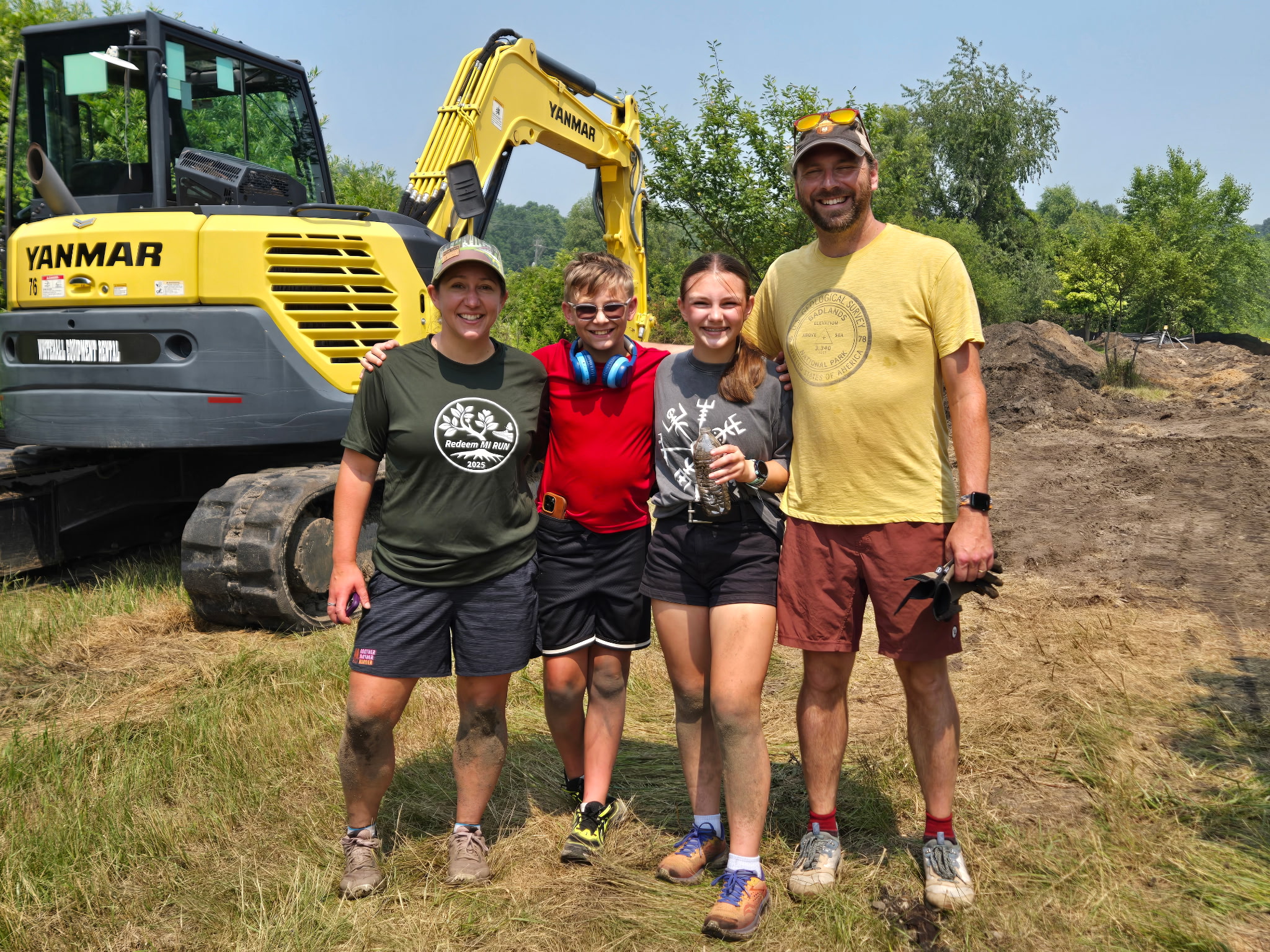
Refugia Podcast Episode 34 A Parable of Redemption: Dave Celesky and Redeem MI Land
Today I’m talking with Rev. Dr. Dave Celesky, pastor of Unity Reformed Church in Norton Shores, Michigan. I’ll be asking Dave about the nonprofit organization he founded called Redeem MI Land, with “MI” spelled “M-I” for Michigan. The idea is to have churches or faith groups purchase a piece of degraded land, and, with community partners, redeem and heal it. Dave speaks eloquently about how this work can serve as an embodied parable for redemption and create vital community connections through a shared project.

A Field Guide to Invasive Weeds at Church
If we think of the church as a garden—or maybe a vineyard, to be more in keeping with Jesus’ kingdom parables—that would suggest that we need to keep after the weeds. If we want to bear fruit and continue to cultivate healthy soil, well, some plants just don’t help. They take up nutrients and space that could be going toward the good fruit. The invasive ones become aggressive and can easily take over the whole garden if left to their own devices.

Refugia Podcast Episode 33 The Garden Became the Steeple: Heber Brown and the Black Church Food Security Network
Today, I’m talking with Rev. Dr. Heber Brown, founder of the Black Church Food Security Network. Beginning with a small congregation, a 1500-square foot garden, and a divine calling, the Black Church Food Security Network now connects 250 Black churches and 100 Black farmers in the Mid-Atlantic states and beyond. Reverend Brown’s story weaves through issues of health justice, food security and climate resilience.

Refugia Podcast Episode 32 It All Started with Styrofoam Cups: Judy Hinck and Mount Olive Lutheran
It All Started with Styrofoam Cups: Judy Hinck and Mount Olive Lutheran

Why Are Churches “Declining”?
We can attempt to answer that question any number of ways, but sociology can offer some helpful insights. I read Notre Dame sociologist Christian Smith’s new book, Why Religion Went Obsolete, earlier this summer, and I found it breathtakingly explanatory for much of what I’ve witnessed in my own experience across the past six decades.
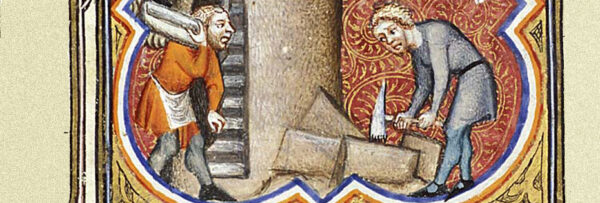
What Is Mature Hope?
Fortunately, the sociological literature on hope is a growing field. Can a bunch of sociologists offer us some insight on hope? I was recently part of a lively conversation in which we tried to figure that out.

